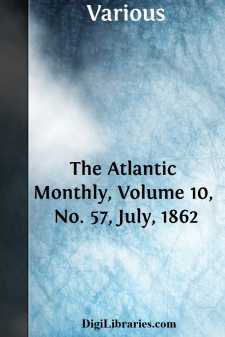Categories
- Antiques & Collectibles 13
- Architecture 36
- Art 48
- Bibles 22
- Biography & Autobiography 813
- Body, Mind & Spirit 142
- Business & Economics 28
- Children's Books 15
- Children's Fiction 12
- Computers 4
- Cooking 94
- Crafts & Hobbies 4
- Drama 346
- Education 46
- Family & Relationships 57
- Fiction 11828
- Games 19
- Gardening 17
- Health & Fitness 34
- History 1377
- House & Home 1
- Humor 147
- Juvenile Fiction 1873
- Juvenile Nonfiction 202
- Language Arts & Disciplines 88
- Law 16
- Literary Collections 686
- Literary Criticism 179
- Mathematics 13
- Medical 41
- Music 40
- Nature 179
- Non-Classifiable 1768
- Performing Arts 7
- Periodicals 1453
- Philosophy 64
- Photography 2
- Poetry 896
- Political Science 203
- Psychology 42
- Reference 154
- Religion 513
- Science 126
- Self-Help 84
- Social Science 81
- Sports & Recreation 34
- Study Aids 3
- Technology & Engineering 59
- Transportation 23
- Travel 463
- True Crime 29
The Atlantic Monthly, Volume 10, No. 57, July, 1862
by: Various
Categories:
Description:
Excerpt
SOME SOLDIER-POETRY.
It is certain that since the time of Homer the deeds and circumstances of war have not been felicitously sung. If any ideas have been the subject of the strife, they seldom appear to advantage in the poems which chronicle it, or in the verses devoted to the praise of heroes. Remove the "Iliad," the "Nibelungenlied," some English, Spanish, and Northern ballads, two or three Old-Bohemian, the war-songs composed by Ziska, and one or two Romaic, from the field of investigation, and one is astonished at the scanty gleaning of battle-poetry, camp-songs, and rhymes that have been scattered in the wake of great campaigns, and many of the above-mentioned are more historical or mythological than descriptive of war. The quantity of political songs and ballads, serious and satirical, which were suggested by the great critical moments of modern history, is immense. Every country has, or might have, its own peculiar collections. In France the troubles of the League gave an impulse to song-writing, and the productions of Desportes and Bertaut are relics of that time. Historical and revolutionary songs abound in all countries; but even the "Marseillaise," the gay, ferocious "Carmagnole," and the "Ça Ira," which somebody wrote upon a drum-head in the Champ de Mars, do not belong to fighting-poetry. The actual business of following into the field the men who represent the tendencies of any time, and of helping to get through with the unavoidable fighting-jobs which they organize, seems to inspire the same rhetoric in every age, and to reproduce the same set of conventional war-images. The range of feeling is narrow; the enthusiasm for great generals is expressed in pompous commonplaces; even the dramatic circumstances of a campaign full of the movement and suffering of great masses of men, in bivouac, upon the march, in the gloomy and perilous defile, during a retreat, and in the hours when wavering victory suddenly turns and lets her hot lips be kissed, are scarcely seen, or feebly hinted at. The horizon of the battle-field itself is limited, and it is impossible to obtain a total impression of the picturesque and terrible fact. After the smoke has rolled away, the historian finds a position whence the scenes deliberately reveal to him all their connection, and reenact their passion. He is the real poet of these solemn passages in the life of man. [1]
[Footnote 1: There is a little volume, called Voices from the Ranks, in which numerous letters written by privates, corporals, etc., in the Crimea, are collected and arranged. They are full of incident and pathos. Suffering, daring, and humor, the love of home, and the religious dependence of men capable of telling their own Iliad, make this a very powerful book. In modern times the best literature of a campaign will be found in private letters. We have some from Magenta and Solferino, written by Frenchmen; the character stands very clear in them. And here is one written by an English lad, who is describing a landing from boats in Finland, when he shot his first man....












